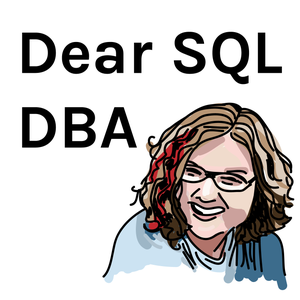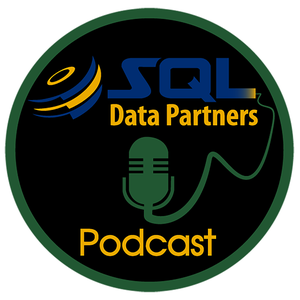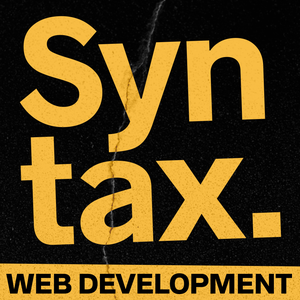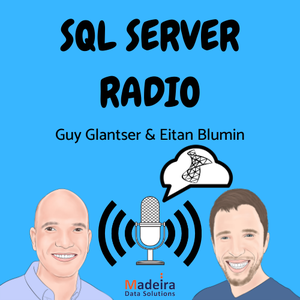
Dear SQL DBA
Kendra Little
- 1 hour 4 minutesErik Darling and Kendra Little Rate SQL Server Perf Tuning Techniques
Erik Darling joins Kendra Little to rate different SQL Server Performance Tuning Techniques in episode 81 of the Dear SQL DBA podcast. We share our opinions of... (deep breath)
Recompile hints, Query Store hints and plan forcing, CTEs, Resource Governor, the legacy cardinality estimator, Table Variables, Automatic Plan Correction, Batch Mode, index rebuilds, Hekaton, NOLOCK, page compression, partitioning, filtered indexes, columnstore, join hints, PSPO, indexed hints, indexed views, optimize for unknown, RCSI, adding more memory, restarting the damn thing, scalar UDFs, and Persisted Memory Grant Feedback.
20 May 2024, 2:36 pm - 53 minutes 54 secondsPower BI Performance Tuning with Eugene Meidinger
Eugene Meidinger stops by to chat about Power BI Performance Tuning with Kendra. We talk about the various engines and languages used in Power BI and big-picture strategies for getting performance from the start. Eugene then talks about the community of tools and techniques that can be used to dig in and solve performance problems in Power BI.
Eugene's new Pluralsight course on Perf tuning Power BI launches on February 5th, 2024. The first 50 sales will be only $20. If you don't get one of those lucky spots, use code RACOONS to get 50% off.
Find more of Eugene's content at sqlgene.com.
15 January 2024, 6:11 pm - 1 hour 5 minutesAutomated Deployments and the Art of the Database with Database Michael J Swart
In this episode, Michael J Swart joins the Dear SQL DBA podcast to talk about databases, automation, and how he’s come to illustrate some of the coolest blog posts ever to be written about data.
Check out Michael’s art and blog posts at michaeljswart.com, and explore his posts by illustration at https://michaeljswart.com/browse-articles-by-illustration/.
26 September 2023, 3:51 pm - 28 minutes 57 secondsJer and Kendar Explore Optimized Locking
SQL Server has a new feature that’s currently only available in Azure SQL Database: Optimized Locking. Jeremiah Peschka joins the podcast to talk through the docs and nerd out on locks, blocks, and how to pronounce the acronym “LAQ”.
Learn more about this feature online:
- Optimized locking article from Microsoft Learn
- Transaction locking and row versioning guide
4 September 2023, 2:56 pm - 1 hour 28 secondsAdvice for Technical Leaders with Alex Robson
Ever wondered what it's like to be a VP or Director of Engineering? Kendra chats with Alex Robson about leadership in technology, what you can get out of coaching or an MBA program (should you be interested), and what makes a high performing team. We'll also chat about recommended content to hone your tech leadership skills.
Alex Robson's site and blog: https://robsonconsulting.services
Alex's content recommendations for folks who want to think more about technical leadership:
"I believe Camille Fournier and Will Larson are wonderful writers with invaluable insights and advice. For product thinking, I recommend folks read The Lean Startup by Eric Ries, Principles of Lean Product Development Flow by Don Reinertsen, Safer Sooner Happier by Jonathan Smart, and Accelerate by Dr. Nicole Forsgren. Be sure to read books on leadership that are outside of engineering. Dan Pink’s Drive and Eliyahu Goldratt’s The Goal are two of my usual recommendations. Last but not least - read books that are about human behavior. Both economists and psychologists ask important questions that may help you unlock better ways to relate to and understand others. I love Daniel Kahneman’s Thinking Fast and Slow, and highly recommend Mistakes Were Made (but not by me) by Carol Tavins and Elliot Aronson."
25 August 2023, 8:38 pm - 52 minutes 45 secondsErik Darling on Performance Tuning
SQL Server performance tuning expert Erik Darling joins the podcast today to chat about how good queries can go bad, how bad queries can get better, and the question on everyone's mind: if he was a database, what database would he be?
This episode contains some mildly explicit language.
Erik's blog: https://erikdarlingdata.com/blog/ Erik's YouTube: https://www.youtube.com/@ErikDarlingData
21 August 2023, 4:51 pm - 29 minutes 6 secondsWhat's up with Tech Interviews in 2023? With Jeremiah Peschka.
Tech interviews are weird and wacky. How did they get this way, and how SHOULD they be? Jeremiah Peschka joins us to discuss.
11 August 2023, 7:04 pm - 24 minutes 52 secondsData Roles: DBA, DBRE, and Data Engineer
There are lots of jobs for data folks. In this episode, I'm discussing three hot job titles: Database Administrator (DBA), Database Reliability Engineer (DBRE), and Data Engineer (DE) To see the venn diagrams I made for these roles, visit https://catalyzesql.com/blog/1/01/01/dear-sql-dba-data-roles-dba-dbre-de/
4 August 2023, 6:58 pm - 14 minutes 19 secondsWhen NOT to choose SQL Server to store your dataI wrote a blog post inspired by Stephen Vakil's excellent suggested interview question, but I inverted it: When should you NOT choose SQL Server to store your data? My thoughts: * When you don't actually need a database * When you're not using structured data * When you want pure analytics, or something other than a workload involving OLTP * When you need to write to multiple nodes for a single database * When your team wants a PAAS solution (lil pedantic on this, the hosted versions are slightly different) * When your team needs a cheap solution What do you think?
This podcast is available in blog post form: https://littlekendra.com/2023/06/21/when-not-to-choose-sql-server/
22 June 2023, 8:21 pm - 9 minutes 52 secondsDown Tools Week 2020
It's Down Tools Week at Redgate. I share what "Down Tools Week" is, what I'm working on this week, and why I think it's a terrific experience for fostering creativity, innovation, and teamwork. In closing I share some thoughts on variations of this kind of project which you might use in your own organization, whether you are a developer, DBA, or have another role.
5 August 2020, 4:22 pm - 28 minutes 12 seconds3 Things That Shouldn't Be Normal in Database Development
Many people use entrenched processes for database development that have been in place so long that it's hard to imagine doing it any other way. In this episode, I share three things that should NOT be normal for database development-- but which are incredibly common. This episode is inspired by the book, "The Unicorn Project", by Gene Kim.
23 July 2020, 9:28 am - More Episodes? Get the App
Your feedback is valuable to us. Should you encounter any bugs, glitches, lack of functionality or other problems, please email us on [email protected] or join Moon.FM Telegram Group where you can talk directly to the dev team who are happy to answer any queries.
 SQL Data Partners Podcast
SQL Data Partners Podcast
 JS Party: JavaScript, CSS, Web Development
JS Party: JavaScript, CSS, Web Development
 Syntax - Tasty Web Development Treats
Syntax - Tasty Web Development Treats
 voiceofthedba's podcast
voiceofthedba's podcast
 The Changelog: Software Development, Open Source
The Changelog: Software Development, Open Source
 SQL Server Radio
SQL Server Radio